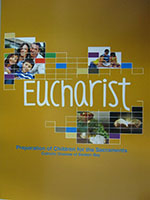First Holy Communion

For those wishing to enrol your children for the Sacrament of First Holy Communion, please download and complete the ENROLMENT FORM
For information including dates and details for this year's Eucharist programme, please download 2022 Sacramental Programme EUCHARIST

Other enquiries can be made through the Parish Office.
The Sacrament of the Eucharist
“While they were eating, Jesus took a loaf of bread, and after blessing it, he broke it, gave it to his disciples, and said, ‘Take, eat; this is my body”. (Matthew 26:26)
To a Catholic the Mass is not only a sacred offering, but also a sacred meal. That is why Jesus chose and we use bread and wine in the Mass. We experience God's love and friendship for us by accepting to eat "the bread of life".
When the time for Holy Communion comes at Mass the priest holds up Christ, saying: "This is the Lamb of God who takes away the sins of the world. Happy are those who are called to his supper". The priest receives Communion and then places the body of Christ in the hand of each person who wishes to receive Our Lord. Communion may also be on the tongue.
Promise of the Holy Eucharist
The sixth chapter of St John's Gospel tells how Christ promised to give himself in Holy Communion. Jesus said: "I am the bread of life; whoever comes to me shall not hunger, and whoever believes in me shall never thirst" (John 6, 35). "I am the bread of life. Your fathers ate the manna in the wilderness, and they died. This is the bread which comes down from heaven, that a man may eat of it and not die. I am the living bread that came down from heaven, whoever eats of this bread, will live forever" (John 6, 48-5 1).
This was startling enough, but his next words were amazing: "And the bread which I shall give for the life of the world is my flesh" (John 6, 51). Christ is saying here what he said on many other occasions, that he came from God the Father to give new life to all people. As food gives natural life, he would give supernatural life. To those who believed what he taught he would be united, as food is united to the body, and they would live his life.
This is the gift and promise of the Eucharist.
First Holy Communion
Holy Communion is one of the three sacraments of initiation in the Church. It is the final sacrament of initiation and follows Baptism and Confirmation. When we have received all three sacraments, we are a fully initiated member of the Church.
We look forward to sharing this special moment with your family at Our Lady Star of the Sea.
Preparation for this sacrament is a special programme prior to and culminating in the celebration of First Holy Communion. Special circumstances may be discussed on an as needed basis. Please contact eh Parish Office.
Questions and Answers from the Catechism of the Catholic Church.
The institution of the Eucharist
After Jesus had gathered with his apostles in the Cenacle, He took bread in his hands. He broke it
and gave it to them saying, “Take this and eat it, all of you; this is my Body which will be given up for you”. Then, he took the cup of wine in his hands and said, “Take this and drink of this, all of you. This is the cup of my Blood, the Blood of the new and everlasting covenant. It will be shed for you and for all so that sins may be forgive. Do this in memory of me”. (CCC 273)
When does the Church oblige her members to participate at Holy Mass?
The Church obliges the faithful to participate at Holy Mass every Sunday and on holy days of obligation. She recommends participation at Holy Mass on other days as well. (CCC 1389, 1417)
When must one receive Holy Communion?
The Church recommends that the faithful, if they have the required dispositions, receive Holy Communion whenever they participate at Holy Mass. However, the Church obliges them to receive Holy Communion at least once a year during the Easter season. (CCC 1389)
What is required to receive Holy Communion?
To receive Holy Communion one must be fully incorporated into the Catholic Church and be in the state of grace, that is, not conscious of being in mortal sin. Anyone who is conscious of having committed a grave sin must first receive the sacrament of Reconciliation before going to Communion. Also important for those receiving Holy Communion are a spirit of recollection and prayer, observance of the fast prescribed by the Church, and an appropriate disposition of the body (gestures and dress) as a sign of respect for Christ. (CCC 1385-1389, 1415)
What are the fruits of Holy Communion?
Holy Communion increases our union with Christ and with his Church. It preserves and renews the life of grace received at Baptism and Confirmation and makes us grow in love for our neighbour. It strengthens us in charity, wipes away venial sins and preserves us from mortal sin in the future. (CCC 1391-1397, 1416)